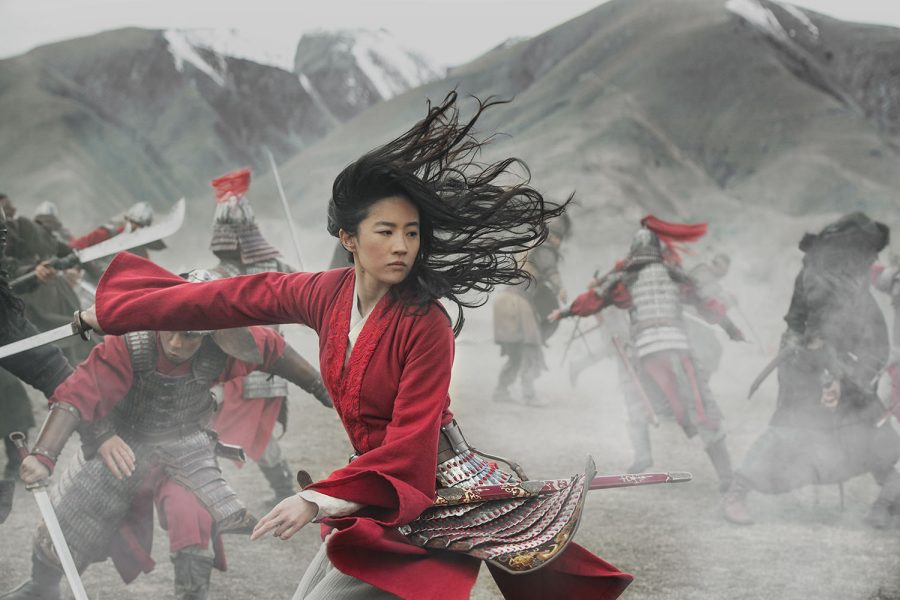Opinion | Lifeless live-action: Disney’s Mulan remake ignores the original’s message
The live-action adaptation of Disney’s Mulan takes out everything that gave the story heart and replaces it with cringe-worthy stunt work.
Yifei Liu stars as the title character in Mulan.
September 22, 2020
Disney’s live-action Mulan has received a lot of criticism. Between its $30 price on a streaming service that users already pay for, to its lead actress’ support of the Hong Kong police, it’s no wonder an international movement has developed to boycott the remake.
There is so much to criticize about the film itself even beyond these glaring issues, which is where my primary focus will be.
Disney said it aimed to take a more realistic approach to Mulan’s story. It’s for this reason the musical numbers we know and love, Mushu the dragon, and Mulan’s lucky cricket were removed from this version.
While I have no problem with their absence from the film, I do take issue with the claim this choice was part of a decision to make the adaptation more realistic, because in this version, Mulan has superpowers. Yeah. Superpowers.
Mulan’s powers come from the traditional Chinese belief of Qi, the energy that’s responsible for a person’s life force. In this film, Mulan has powerful Qi, which she uses to kick projectiles in midair and run on walls. It also gives her unnatural strength and speed.
As far as historical accuracy goes, the original Mulan of the Chinese ballad does not have Qi superpowers. I see that Disney was trying to tie Chinese tradition into the film, but Qi doesn’t fit in this story.
For men, Qi is considered a warrior’s blessing. For women, however, having powerful Qi makes you a witch. Because of these rules, the conflict in the movie becomes Mulan’s hiding being a woman after she fails to hide her Qi while posing as a man.
This change to Disney’s original animated feature undermines the message of Mulan entirely.
RELATED: Opinion | The Mandalorian makes Disney+ worth it
In the animated version, we see Mulan fail to meet both the expectations of a traditional woman and a traditional man. Instead, she uses her cleverness – which wasn’t valued by the women or men in her life – to lead the army to victory. She relies on her own abilities instead of the abilities she’s expected to have as a woman or a man. Being herself is her strength.
In the live-action version, Mulan faces no challenges other than hiding her true identity because Qi makes her good at everything. What’s the message there? That people shouldn’t be sexist when a woman has talents that are exploitable? Groundbreaking.
The addition of Qi also diminishes the sacrifice Mulan makes for her father by taking his place in the war. The animated Mulan knows that she’s not a warrior and could easily die — strengthening the power of her sacrifice. Live-action Mulan can kick arrows out of the air.
The other striking difference between the two Mulans is their personalities. Animated Mulan is witty, brave, and an important role model for young women. Live-action Mulan lacks all of these qualities and I couldn’t find anything particularly likable about her.
In addition to the complete lack of a meaningful lesson, the film editing is bizarre. The shots linger and zoom in on moments that don’t need those angles and cuts away from action shots so quickly that it’s difficult to keep track of what exactly is going on.
My best guess is that these odd editing choices are to hide the sloppy wire work they used to make Mulan run on walls. While I understand that the wire stunts are paying homage to classic kung-fu movies – affectionately nicknamed “wire-fu” by fans – there’s no denying that it just looked bad.
Under no circumstances should you waste $30 to watch this. Watch the animated version instead. Aside from a few dated jokes that should be acknowledged, the original movie’s message still holds up. There’s no reason to let the remake ruin your childhood nostalgia.





